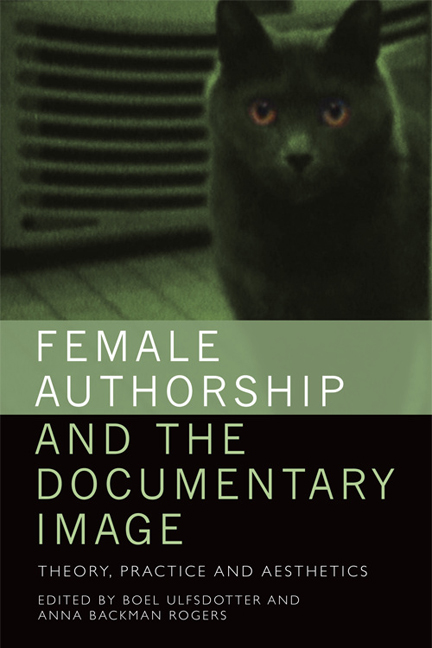Book contents
- Frontmatter
- Contents
- List of Illustrations
- Notes on the Contributors
- Foreword
- Introduction
- PART ONE DOCUMENTARY PRACTICES
- PART TWO DOCUMENTARY THEORIES
- PART THREE FEMALE AUTHORSHIP AND GLOBAL IDENTITIES
- ‘Being a Woman Documentary Maker in Taiwan’ – An interview with Singing Chen and Wuna Wu
- Select Bibliography
- Index
Foreword
Published online by Cambridge University Press: 05 May 2021
- Frontmatter
- Contents
- List of Illustrations
- Notes on the Contributors
- Foreword
- Introduction
- PART ONE DOCUMENTARY PRACTICES
- PART TWO DOCUMENTARY THEORIES
- PART THREE FEMALE AUTHORSHIP AND GLOBAL IDENTITIES
- ‘Being a Woman Documentary Maker in Taiwan’ – An interview with Singing Chen and Wuna Wu
- Select Bibliography
- Index
Summary
The relationship between feminist approaches and documentary film has never been adequately addressed in film studies. The important history of the female documentarian, moreover, has never been told. While a handful of key texts address this area, their number is dwarfed when compared to feminist film criticism's attention to fiction. As a result, feminist analytical paradigms for documentary have not been established with any significant force. This omission has occurred, perhaps, because the stakes have been misjudged – documentary has been relegated to the realm of education, considered to lack the expressivity or influence of arthouse cinema or popular cinema respectively. Such assumptions, however, do not adequately account for the documentary form, its diversity and its potential for affective charge. They also fail to acknowledge the clear importance of the nonfiction mode for feminism and female filmmakers.
As has been a rich topic of debate in the popular press in recent years, female creative practitioners have been denied significant or equal access to the Hollywood industrial machine and the markers of prestige that accompany it. This is despite the growing number of female executives. Documentary is frequently produced on a lower budget, with projects more plentiful, often tied to television and allowed more capacity for exploring themes that address a female audience. These are some of reasons why women have access to documentary production when they are greatly under-represented in fiction. As Kathleen McHugh writes, an alternative history of women filmmakers ‘emerges when we follow the (production) money’. A full appreciation of the diverse pathways women take through film and television industries requires an investigation into what enables the representation of women on screen, supports the styles of production often favoured by women or intervenes in the dominant models that perpetuate all-male crews. Such an investigation would find that documentary (in all its different modalities) is frequently integral to the careers of female filmmakers. It is critical to women's representation in the industry in many parts of the world. Thinking more in terms of documentary pedagogy, nonfiction is also the preferred genre for activists and grass-roots organisers working at the forefront of feminist politics.
- Type
- Chapter
- Information
- Female Authorship and the Documentary ImageTheory, Practice and Aesthetics, pp. xiii - xviPublisher: Edinburgh University PressPrint publication year: 2018



